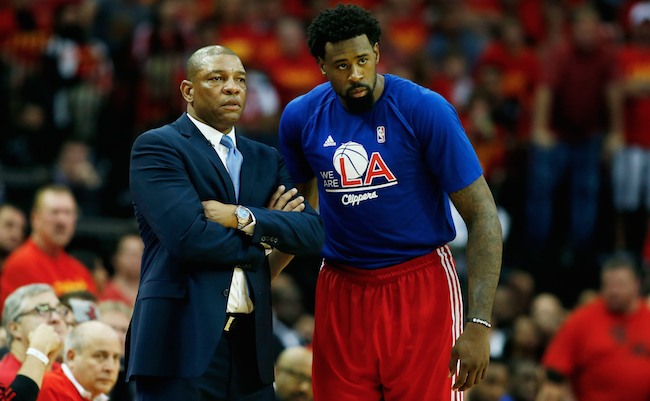Fire Doc Rivers!
Not actually, of course. The Los Angeles Clippers’ coach certainly deserves a share of the blame for his team’s epic collapse in the Western Conference Semifinals, and perhaps should be relieved as his franchise’s primary personnel decision-maker, too. But he’s a fantastic motivator and has somehow become underrated in terms of strategic worth.
Rivers is a very good coach, which casts major doubt on the merits of two of basketball’s supposed top-five defensive players.
The Clippers’ Chris Paul and DeAndre Jordan join the San Antonio Spurs’ Kawhi Leonard, Golden State Warriors’ Draymond Green, and Memphis Grizzlies’ Tony Allen on the 2014-2015 All-Defensive First Team. The Second Team is comprised of the New Orleans Pelicans’ Anthony Davis, Chicago Bulls’ Jimmy Butler, Warriors’ Andrew Bogut, Washington Wizards’ John Wall, and Spurs’ Tim Duncan.
The teams were voted on by 130 media members assembled throughout North America. Full voting results can be found here.
We’ve few major qualms with the selected teams. At the very least, it’s easy to understand why each of the 10 honorees received enough points in the balloting to garner an All-Defense spot. That Bogut and Duncan were honored, in particular, is especially heartening considering counting stats don’t do their supreme impact as back-line helpers and intimidators justice.
As always, things get murkier when considering the Second Team’s periphery. Russell Westbrook, for instance, has no business sniffing this kind of postseason honor, yet ranked third among players who received votes but couldn’t quite crack the top-10. LeBron James was an almost equally ridiculous second in that group, and one delusional voter awarded Jeff Teague a first-place tally.
There were bright spots there, too. Rudy Gobert came just 10 points short of nudging Duncan from another All-Defense Team; ascendant wing stoppers Michael Kidd-Gilchrist, Danny Green, and Khris Middleton were high amid ancillary vote-getters; and the perennially underrated Paul Millsap was acknowledged, too.
The voters did a mostly solid job here. Still, something simply doesn’t add up about the selections of Paul and Jordan. How can Los Angeles, boasting a pair of truly elite defenders, have possibly managed the league’s most average defense overall this season?
It’s not due to the players surrounding Paul and Jordan. If the postseason told us one thing about the Clippers as a whole other than their obvious need for far greater emotional stability, it’s that Rivers’ starting lineup is comprised of solid players on that side of the ball. Blake Griffin made sublime help rotations on the weak-side and in pick-and-rolls until Los Angeles’ last game of the season; J.J. Redick bothered James Harden throughout the Western Conference Finals with smarts and discipline; and the team’s defensive rating skyrocketed from 101.1 to 111.4 when Matt Barnes hit the bench.
And indeed, the Clippers’ starters allowed a sterling 95.5 points per 100 possessions in the playoffs – just under 10 points better than the team’s overall mark. Surprise! The bench is Los Angeles’ problem. But nearly as glaring an issue in the context of All-Defense teams is that the influences Paul and Jordan weren’t able to keep reserve-heavy units from leaking points.

And it’s the big man’s consistent inability to do so that is most concerning for Los Angeles going forward.
Defense is never about one player. Basketball has always been a team game, after all, and the league’s increasing reliance on spacing the floor has made the simultaneous stops, helps, and recovers of a five-man unit more important than ever. If teammates constantly communicate and move in complete sync, the whole of a defense can be far greater than the sum of its parts.
Yet breakdowns are inevitable. There are too many possessions, actions, and counters over 48 minutes to expect anything better. And what separates the best interior defenders from the rest is a capacity to dependably cover up his teammates’ mistakes. That innate sense of timing and position is what makes Bogut arguably the top defensive player in the world, Duncan a 15-time All-Defense selection, and Kevin Garnett still effective as his knees have almost completely failed him.
Jordan doesn’t have it, a relative flaw exhibited throughout the playoffs that shouldn’t have been surprising given regular season analysis. There’s no postseason metric available that supports his reputation as basketball’s preeminent defensive center – other than blocks, of course. Not on-off numbers; not opponent’s success at the rim; and not their performance when he was a primary defender, either.
The Clippers’ defensive woes are bigger than Jordan, and certainly Paul. Given the former’s still burgeoning status as a peerless and game-changing defender, though, it’s not unfair to expect his impact to extend far beyond its current level. As Bogut and others show, that type of sweeping effect is possible.
But it just isn’t for Jordan at the moment and might not ever be, a depressing reality that will continue to make Los Angeles’ middling defense difficult to improve until Rivers comes to grips with it.






